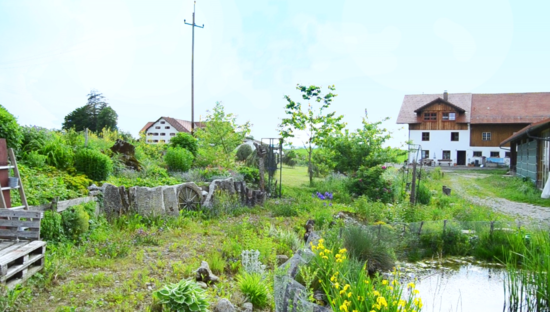Permakultur leben - Utopien schaffen
A Short Documentary on Permaculture
21.09.2018
by Julia Mittermüller & David Stäblein
Supervisor: Dr. Ursula Münster
Permaculture Life
By Building Utopias
Julia and I met for the very first time at the social entrepreneurship academy workshop, organized by the TU Munich, but we both realized that we must have seen us at the Rachel Carson Center certificate student program before. Some weeks later we decided to combine our ideas as well as our passion for gardening and alternative ways of eating. As the final project for the Rachel Carson Center was soon due, we decided on producing a movie about these topics.
The topics food production, cycling processes, limitless consumption, and sustainability are for us more than just empty phrases you use in your daily life. A small group of farmers from the Allgäu – located in southern Bavaria – caught our interest.
The permaculture farmers, how they call themselves, are planting different kinds of plants for their self-subsistence. Some of them quit their jobs and left the old, mundane life behind – others still work in their regular jobs but all of them are more or less members/ partners of the “Permakulturfreunde Allgäu”. An association, founded by Jochen Koller, which builds on the idea of permaculture and traditional methods of cultivation. This association became quite famous in the German and Austrian permaculture scene.
The whole permaculture idea is not just a modern hype, many indigenous people practiced and are still practicing permaculture as sustainable cultivation. It is required in many areas around the globe, but as the western dominated society changed their cultivation from small scale farming to a high technological, profit-orientated farming industry so fast, many sustainable practices disappeared and so did sustainable farming.
The founders of the new permaculture idea were Bill Mollison and David Holmgren from the University of Tasmania. They gathered all sustainable ideas of cultivation as well as sustainable living and combined all of them in multifaced strategies for households, gardens, society and other fields. The main philosophy is “working with, rather than against nature” Mollison, B. (1991).
The first protagonist of the movie, Andi, is practicing the permaculture life in the northern part of Tyrol, close to the Allgäu area. He keeps close connections to the “Permakulturfreunde Allgäu”. His vision of practicing permaculture in his hometown 1000m above sea level (similar to Sepp Holzer’s farm in Salzburg, Austria) was established on an old pasture next to a ski- resort hotel complex. He got the idea of practicing permaculture from his grandmother, she cultivated vegetables at the same place to pass the great famine after the second world war.
The second permaculture farm shown in the movie is close to Kempten, its managed by the extraordinary and friendly couple named Lisa and Willi. Lisa grew up in a traditional farmer’s family and has an enormous knowledge of practical experience and on the difference between conventional and permaculture farming. Willi is working with teenagers, he sometimes teaches them ideas of permaculture farming on his own land. Lisa and Willi have also many helping hands from the whole area of Kempten to master all the work in spring and summer. The helpers get remunerated with delicious fruits and vegetables from the permaculture garden and of course a lot of knowledge about permaculture.
The last character is Jochen Koller itself. He is not practicing permaculture on a scale like Andi or Lisa and Willi, but he plays a significant role as mentor and organizer in the permacultural activism in southern Germany. His vision is to spread the knowledge as well as the ideas of permaculture into the Bavarian agriculture-society and achieve greater acceptance of the conventional farmers.

The aim of the movie was to present the people behind the idea of changing life for the vision of permaculture. This, of course, brings also complications, some of them are enormous that some the farmers had to diminish their ideas of permaculture before they could practice it. The difference of conventional farming to permaculture is so enormous that the question arises if conventional farmers using artificial nutrition inputs next to a permaculture field, could you still sell your products labelled permacultural? Or does the conventionally farmed land affect the permaculture land so intense that is somehow impossible to have pure products of permaculture?
But, the most interesting part for us was still the personal aim and motivation behind this alternative way of thinking and daily struggles. After all, our intention is mainly that everybody can do permaculture in his/her daily life. A permaculture rooftop garden or changing personal produced products between friends and neighbours could be a start into everybody’s permacultures sustainable circle wherever she or he lives.

